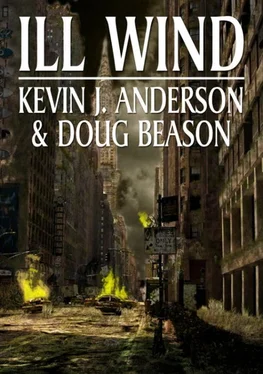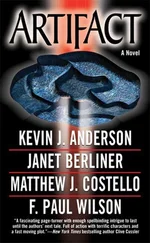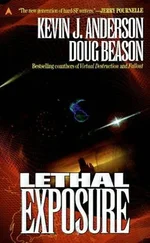“Until such time as that becomes feasible, every day at—” The sergeant looked down at a sheet of paper listing intersections and times, “thirteen thirty, that’s one thirty in the afternoon, we will hold announcements right here in this intersection. We will also distribute food, water, and medical supplies for those in need. But listen carefully—because of the large number of people under our protection, we will have only one hour to accomplish these tasks.”
A low rumble ran through the crowd. The sergeant held up a hand. “Just a minute—I’m not finished!”
When the crowd did not immediately fall silent, one of the security officers fired his rifle up in the air. The sergeant looked around, then continued.
“Several new laws have been established. The most important is that a curfew will be in place from sundown to sunup. Because we have no electrical power in the city, it is difficult to provide protection for everyone at night. By order of President Mayeaux, Brigadier General Bayclock, the base commander of Kirtland, has assumed command during this interim period of martial law. Mayor Reinski fully endorses these measures and strongly encourages all citizens to cooperate.”
The master sergeant looked over the crowd. “We’re here to help you. Until things return to working order, we’re all in this together, and we have to do the best we can.”
Satisfied that the exchange was under control, General Bayclock pulled back on the reins of his horse. The gelding backed up a few paces, then wheeled around.
Bayclock faced Mayor Reinski, who quietly watched the exchange. “The next few days are going to be critical—we’ve got to use an iron hand.”
The young mayor seemed to have lost weight; his eyes were red, encircled by dark rings. Reinski did not respond.
Bayclock snorted, half inclined to ignore the mayor, but he realized the importance of appearances, even during times of martial law. “I’m heading back to the base, moving my headquarters to the more secure Manzano mountain complex, and I advise you to come with me. Not everyone agrees with what we’re doing, and I won’t be able to protect you unless you’re under my charge. I have doubled security at the base.”
Reinski spoke in a low voice. “Aren’t you going a bit overboard, General?”
Anger flashed through Bayclock’s body like a snapped rubber band. “Maybe you don’t remember your history, Mr. Mayor, but the most effective military bastions live as a symbol of threat, especially in times like these. Remember the Bastille.”
Reinski merely pressed his lips together. The sounds of the uneasy crowd caused Bayclock to twist around in his saddle. When the security policemen shoved several people to the ground, loud shouts erupted. One man reached up, flailing to protect himself. Above the shouting, the master sergeant waved his arms and tried to bring the crowd under control. Slowly the people at the edge of the crowd started to disperse, defusing a potential riot.
Bayclock turned back to Reinski. “This is going to have to continue until we make an example of someone. These people have to get it through their heads them just how serious we are.”
Still filled with hellfire-and-damnation from the previous night’s rally and the march up the abandoned freeway, Jake Torgens and the mob arrived at the Oilstar refinery demanding vengeance—but the guards had already abandoned the front gate of the refinery complex.
Jake glared through the dusty glass of the empty guard shack. One of the windows had fallen in, and only a metal-springed skeleton of a chair waited to greet them. Jake was disappointed to meet no resistance.
Many times in the past, the Oilstar security officers had calmly met them at the fences, while Jake and his protesters engaged in “nonviolent civil disobedience”—all perfectly mannered, like a high tea.
But they had vowed not to stop at mere passive resistance this time. Civilized protests were for normal times—not when the country was falling apart. From now on there would be no armbands signalling which demonstrators wanted to be arrested, no waving placards in front of TV cameras. This wasn’t a show; it was survival.
“Inside!” Jake waved his arm forward like a commander ordering his troops. “This place is ours now!” He clutched the chain-link fence as others flowed past carrying sticks and crowbars. He had pulled most of the crowd from angry people on the streets, the ones who wanted to strike out because they had already lost their future. It would solve nothing, but at least the symbol of evil would be removed.
Jake raised his fist in the air. The gesture rippled through the crowd, a mark of solidarity. Jake Torgens could have stopped the entire petroplague disaster from happening if he had taken extreme measures in the first place. It was his greatest failure.
He had been at the Oilstar town meeting, one of the loudest voices opposed to the spraying of Prometheus. He had managed to get a temporary restraining order from Judge Steinberg—and with his network Jake could have filed appeal after appeal to stall the cursed spraying forever. He had held the court order in his own hands while his people stormed the Oilstar pier, waving it and demanding that the helicopter land and obey the law. The Law! But the helicopter had sprayed the deadly microbe anyway.
Now the whole planet was paying for it.
Curses erupted around him. Jake drew in a monumental breath and shouted, “Burn Oilstar to the ground!”
The refinery complex was a nightmare of fractionating towers, piping, valves, ladders, and catwalks. Small white Cushman carts sat abandoned next to enormous metal contraptions. The admin building and research facilities stood in the center of the complex, like an oasis surrounded by the industrial no-man’s-land.
Huge natural gas, crude oil, and gasoline storage tanks rested on the sides of the hills, great metal reservoirs closed off by metal caps. No doubt some of them still held viable fuel—it would have been a precious commodity if the petroplague continued to devour only octane, but with other long-chain polymers falling to pieces, no engine culd still function even if it did have uncontaminated fuel.
But the gas could still burn. Oh yes , Jake thought, it would still burn.
* * *
Inside the bioremediation wing of the Oilstar complex, Mitch Stone stared helplessly at the scrawled notes in front of him. He had used a metal bar to break open the locked drawers of Alex Kramer’s desk, ransacking the original lab books and notes the microbiologist had left behind. The official data and quarterly reports had already been copied and sent to the plague research centers around the country, but there had to be more. Mitch went straight to the source. There had to be more!
“Dammit, Alex! Are you doing this to me on purpose?”
Mitch stared at the handwritten comments. Kramer’s computer—nothing but warped circuit boards, wires, and glass CRT—sat on the desk. The diskettes lay dissolved in unrecognizable piles. But Mitch knew that the old-timer kept actual logbooks. Mitch had teased Alex about it before, but now he blessed the old man for his prehistoric ways.
As he flipped through the pages and stared at the data, despair poured through him. He held the lined paper up to the light from the window. The other pane in Alex’s office had fallen out, dropping three stories to shatter on the ground below. Wind whistled into the room.
Emma Branson paced in front of the desk, waiting for him to answer her. “Stone, are you even more incompetent than I thought? We’ve got to give them something! You were involved in this from square one, don’t you remember anything?”
Читать дальше












